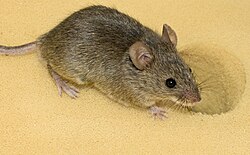глушец
Hello, you have come here looking for the meaning of the word глушец. In DICTIOUS you will not only get to know all the dictionary meanings for the word глушец, but we will also tell you about its etymology, its characteristics and you will know how to say глушец in singular and plural. Everything you need to know about the word глушец you have here. The definition of the word глушец will help you to be more precise and correct when speaking or writing your texts. Knowing the definition ofглушец, as well as those of other words, enriches your vocabulary and provides you with more and better linguistic resources.

животинка глушец

глодач глушец (1)
Bulgarian

Etymology
By surface analysis, глух (gluh, “deaf”) + -ец (-ec).
Formally identical with Polish głuszec (“capercaillie”), Czech hlušec (“capercaillie”), Ukrainian глуше́ць (hlušécʹ, “wood grouse”), Belarusian глушэ́ц (hlušéc, “wood grouse”) (cf. Bulgarian глуха́р (gluhár), глу́ха коко́шка (glúha kokóška, “grouse”) with the same meaning). Georgiev tentatively presumes origin from obsolete *глишь (*glišʹ, “rodent”) of Thracian origin.
Pronunciation
Noun
глуше́ц • (glušéc) m (diminutive глу́шче or глу́ше)
Declension
| singular | plural | |
|---|---|---|
| indefinite | глуше́ц glušéc |
глушци́ glušcí |
| definite (subject form) |
глуше́цът glušécǎt |
глушци́те glušcíte |
| definite (object form) |
глуше́ца glušéca | |
| count form | — | глуше́ца glušéca |
| vocative form | глуше́цо glušéco |
глушци́ glušcí |
Alternative forms
Related terms
- глуха́р (gluhár, “wood grouse”)
- глуха́н (gluhán, “deaf person”)
- глуха́рче (gluhárče), глу́шило (glúšilo, “dandelion”)
References
- “глушец”, in Речник на българския език (in Bulgarian), Sofia: Bulgarian Academy of Sciences, 2014
- “глушец”, in Речник на българския език (in Bulgarian), Chitanka, 2010
- Nayden Gerov (1895) “глуше́ць, -шци”, in Рѣчникъ на Блъгарскꙑй язꙑкъ. Съ тлъкувание рѣчи-тꙑ на Блъгарскꙑ и на Русскꙑ. (in Bulgarian), volume 1, Plovdiv: Дружествена печꙗтница "Съгласие.", page 223
- Georgiev, Vladimir I., editor (1971), “глух², глушец”, in Български етимологичен речник (in Bulgarian), volume 1 (А – З), Sofia: Bulgarian Academy of Sciences Pubg. House, →ISBN, page 253
Macedonian

Pronunciation
Noun
глушец • (glušec) m (plural глувци, diminutive глувче)
Declension
| singular | plural | |
|---|---|---|
| indefinite | глушец (glušec) | глувци (gluvci) |
| definite unspecified | глушецот (glušecot) | глувците (gluvcite) |
| definite proximal | глушецов (glušecov) | глувциве (gluvcive) |
| definite distal | глушецон (glušecon) | глувцине (gluvcine) |
| vocative | глушецу (glušecu) | глувци (gluvci) |
| count form | — | глушеца (glušeca) |
References
- “глушец” in Дигитален речник на македонскиот јазик (Digitalen rečnik na makedonskiot jazik) − drmj.eu
